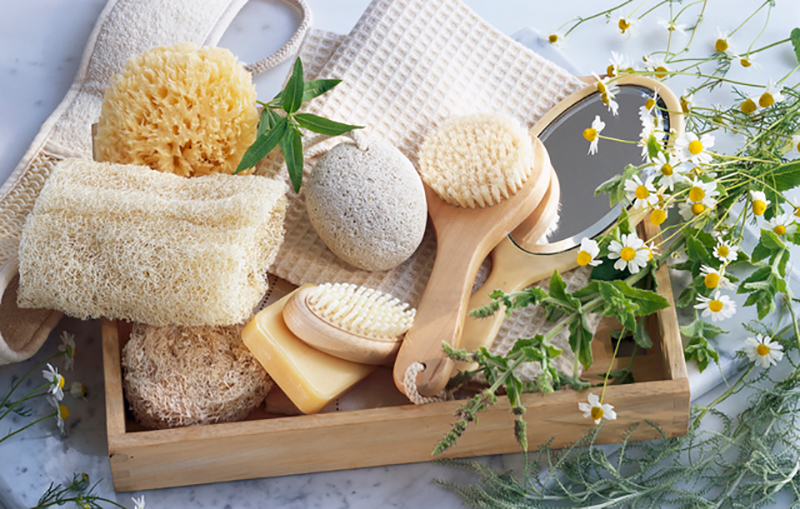Regular exfoliation makes an enormous difference in how your skin looks, feels and ages. Exfoliation keeps pores looking smaller and more refined. It also helps slow the development of fine lines and wrinkles, making them less prominent. Exfoliation is particularly helpful for acne-prone skin that tends to get congested. Acne causing bacteria can get trapped between layers of dead skin and lead to breakouts, but with regular exfoliation bacteria has fewer hiding places to lurk. Skin appears more toned overall when you exfoliate as little as once per week. A little commitment offers big results in this category!
Not only will exfoliation subtly but visibly brighten and smooth skin, you’ll notice an improvement in how you’re able to absorb your serums and moisturizers. The actives in natural products work better when applied to living cells, and these precious botanical ingredients are less efficient when they have to work through dead layers of skin and clogged pores to reach the living cells. Give your products a boost with a good exfoliating treatment. If the improved texture of your skin isn’t inspiring enough, think about the improved performance of your products overall.
What’s The Difference Between Physical and Chemical Exfoliation?
While exfoliation has its benefits, success with exfoliating products comes with a certain amount of know-how. Many of us have experienced what it’s like to over-exfoliate using something that’s too abrasive or harsh. The key to a positive exfoliation experience is finding the right type of treatment for your skin. There are two main types of exfoliation—physical and chemical exfoliation. I love both physical and natural chemical exfoliation, and my skin tolerates them both well. How your skin responds will largely depend on your skin’s level of sensitivity and the type and amount of ingredients in your exfoliating product.
Physical exfoliation relies on gritty, abrasive substances to physically buff the dead skin away from the surface. Think classic sugar and salt scrubs—that’s physical exfoliation. There’s something oh so satisfying about this type of exfoliation, but it’s important to use exfoliants that won’t damage the skin in the process. As you can imagine, there are many natural ingredients that work well to provide physical exfoliation, and salt and sugar are only the beginning. Exfoliating powders made from clays, roots, resins, flowers and grains are exceptional at buffing away dead skin while replenishing with nutrients. Just make sure to use light pressure for a gentle treatment, and stay away from products with sharp or wildly uneven particle sizes. The One Love Organics Brand New Day Microderma Scrub and The Clean Dirt by May Lindstrom are two of my favorite physical exfoliants. You can also use soft sponges like a konjac sponge or a sea sponge for this purpose.
Chemical exfoliation relies on acids and enzymes to dissolve dead skin cells. As opposed to the harsh chemicals found in conventional beauty products, natural chemical exfoliation tends to be far more gentle. Fruit acids like malic acid, lactic acids found in dairy and natural forms of salicylic acid such as that derived from white willow bark will keep pores clear and skin smooth. Similarly, exfoliating enzymes present in plants such as pineapple and papaya work to refine the surface of the skin without any abrasive scrubbing required. These enzymes gently digest and breakdown protein, and are a great option for sensitive skin or those who want a bit of exfoliation everyday, which is why they’re often included in cleansers. The Ursa Major Fantastic Face Wash and the La Bella Figura Gentle Enzyme Cleanser rule in this category.
Don’t underestimate the benefits of chemical and physical exfoliation. For those who want the best of both worlds, many beautiful treatments include both elements of physical and chemical exfoliation, like the Josh Rosebrook Active Enzyme Exfoliator.
Photo: Maximillan Stock Ltd
